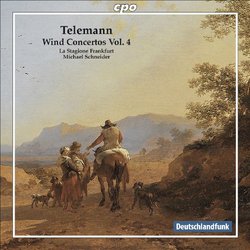| All Artists: Telemann, Schneider, La Stagione Frankfurt Title: Georg Philipp Telemann, Vol. 4: Wind Concertos Members Wishing: 0 Total Copies: 0 Label: Cpo Records Release Date: 5/26/2009 Genre: Classical Style: Symphonies Number of Discs: 1 SwapaCD Credits: 1 UPC: 761203740024 |
Search - Telemann, Schneider, La Stagione Frankfurt :: Georg Philipp Telemann, Vol. 4: Wind Concertos
 | Telemann, Schneider, La Stagione Frankfurt Georg Philipp Telemann, Vol. 4: Wind Concertos Genre: Classical |
Larger Image |
CD Details |
CD ReviewsThe cpo Telemann Wind Concerto Series Continues with a Winne J Scott Morrison | Middlebury VT, USA | 07/09/2009 (5 out of 5 stars) "Someone once joked that between them Telemann and Vivaldi wrote 90% of all the concertos ever written. Not true, of course, but still it is difficult for all but musicologists to sort out how many and what sort of concertos the two wrote. The cpo label has now issued four single CDs with Telemann wind concertos, all featuring the original-instrument La Stagione Frankfurt under the direction of Michael Schneider. I have reviewed only one of them Telemann: Wind Concertos, Vol. 2 and liked what I heard. If anything, I like this one even better.
The concertos on the disc are: 1. Concerto in A Minor for Two Recorders, Strings and Basso Continuo, TWV 52:A2. Unusually (as is true for all the rest of the concertos on this disc) this concerto is in four movements - slow-fast-slow-fast. The concerto's slow movements are grave and solemn, the fast ones lively and dancy. Particularly ingratiating is the final movement with its repeated notes and runs for the two recorders playing in thirds and sixths. 2. Concerto in D Major for Transverse Flute, Strings, Continuo, TWV 51:D2. Although not specifically labeled as such, this concerto is distinctly Polish in style, using polonaise rhythm in the first movement and Polish peasant-style pastorale and dance melodies throughout. The solo flute often imitates sounds from nature. The two fast movements are spirited and virtuosic for the soloist. 3. Concerto in A Major for Oboe d'amore, strings, continuo, TWV 51:A2. The plaintive, pastoral sound of the oboe d'amore is used to good effect throughout. The first movement is a slow siciliano constructed as a lovely aria for the soloist contrasted with a dark tutti ritornello. The third movement is even darker in mood. But the two fast movements - respectively Allegro and Vivace -- counterbalance these with bustling strings and in the fourth movement there is much use made of hunting horn motifs shared by the soloist and the upper strings. 4. Concerto in B Minor for Two Transverse Flutes, Bassoon, Strings and Continuo, TWV 53:H1. This concerto is from a cycle of six concertos in the French style. The Grave first movement is a dignified chaconne whose descending bass line is the basis for an harmonically complex (and unusually chromatic) set of variations. The Allegro second movement has the two flutes playing whirling figures in thirds. The Largo third movement is a sarabande leavened by graceful figurations in all three solo instruments. The Vivace finale is a lively concerto grosso style gigue in which the solo group and the ripieno trade ever more complex passages. 5. Concerto in E Minor for Oboe, Strings, Continuo, TWV 51.E1. This oboe concerto was written for possibly the most celebrated oboist of the early seventeenth century, Johann Christian Richter. The first movement is a plaintive cantilena that gives the soloist opportunity to show off in several cadential passages. The Allegro Molto second movement is virtuosic in the extreme. It is unusual in that there is a middle section that consists of a dramatic recitative for the oboist. The Largo third movement is tender and songful but again there are recitative-like moments. (One wonders if there is an unstated narrative thread for this concerto.) The finale is a lively dance that is nonetheless harmonically and formally complex. This CD certainly gives one a taste of Telemann's skill as a concerto writer and these performances are exceptionally good. For a more extensive taste one might consider the budget-priced 3 CD set of concertos (most for wind soloists) conducted in part by Martin Haselböck Telemann Concertos. Recommended. Scott Morrison " |
